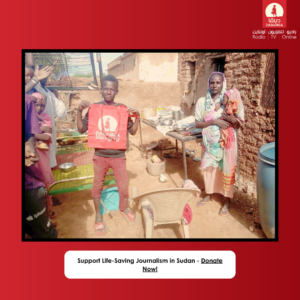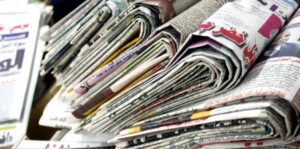Sudanese paper gagged again
On Tuesday, agents of Sudan’s National Intelligence and Security Service (NISS) confiscated the print run of El Jareeda newspaper in Khartoum for the second time this month.
On Tuesday, agents of Sudan’s National Intelligence and Security Service (NISS) confiscated the print run of El Jareeda newspaper in Khartoum for the second time this month.
El Jareeda editor Ashraf Abdel Aziz told Radio Dabanga that no reasons were given for the confiscation.
He expressed surprise at the timing of the confiscation, however, “just as the country is celebrating the conclusion of the National Dialogue conference whose outputs stipulated ensuring press freedoms”.
Journalists suggested said that the reason for the confiscation could be a report on United Nations statistics revealing the prevalence of weakness and stunted growth among the children of Sudan, which was quoted by Arabic and international media including Sky News.
The newspaper’s print run was also confiscated earlier this month, and journalist Shaza El Sheikh was detained by the security apparatus and questioned for three hours about an article published about corruption in El Managil locality and services' demands.
Press curbs
During the past years, the NISS upgraded its already severe restrictions on press freedoms by restoring 'pre-publication censorship' and issuing a number of 'red lines' on matters that are not supposed to be covered by the media.
The purpose of confiscating print-runs is to exhaust the newspapers financially, the editor-in-chief of El Jareeda explained in an earlier interview with Radio Dabanga. “It is in fact a direct and methodical liquidation, meant to kill the independent press,” he said.
Sudan rates 176, together with Gambia and Venezuela, of the 199 countries listed in the Freedom of the Press 2015 report of the USA-based Freedom House.
Restrictions on NISS
The recommendations of Sudan’s National Dialogue stipulate the restriction of the powers of the NISS to the collection and analysis, says the Popular Congress Party.
In early January, the Sudanese parliament passed a number of amendments to the 2005 Interim Constitution. An important amendment concerned the extension of the NISS competences, by which the institution became a full part of Sudan's regular forces. According to the chairman of the parliamentary Popular Congress Party (PCP) block, Dr Ismail Hussein Fadlallah, the “sinful” amendments would convert Sudan into a full-blown police state.
Ibrahim El Sanusi, Secretary-General of the opposition PCP, said in a press conference in Khartoum on Saturday that the Dialogue committees agreed on the restriction of the powers granted to the NISS in the beginning of this year. The mandate of the security apparatus will be restricted to the collection and analysis of information and data, and will be held accountable for its actions by the Parliament.











 and then
and then